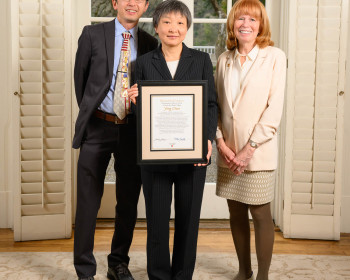Law professors travel to Qatar to protect endangered species
Open gallery

Chris Wold, director of the International Environmental Law Project (IELP), and Erica Thorson, IELP clinical professor, are in Doha, Qatar to help 175 member governments make decisions to protect species from overutilization due to international trade. They are participating in the meeting of the Convention on International Trade in Endangered Species of Wild Fauna and Flora (CITES) from March 13-25, 2010.
“CITES meetings are always exciting, because the Parties adopt or reject proposals by a vote,” Thorson said. “While the CITES Parties strive for consensus, many contentious issues are put to a vote, unlike the climate change negotiations, which often stall because the Parties must achieve consensus.”
As a result, contentious proposals, such as whether to allow ivory trade from Tanzania and Zambia or to ban commercial trade in Atlantic bluefin tuna, will be put to a vote. Close votes are also expected on several proposals to limit international trade in various species of sharks, including the iconic hammerhead shark, which are traded primarily for shark fin soup.
Despite the excitement caused by the proposals to protect specific species, IELP will focus on implementation issues that may affect the Convention for years to come. For example, CITES continues to work on rules for trade in marine species taken on the high seas.
Remarkably, 35 years into the convention, the Parties still have not decided some very basic but critical policies and protocols. As more marine species are protected by CITES, the need to clarify rules such as who should issue fishing permits has become urgent.
“The Parties can no longer deny that fisheries management organizations are managing tuna and other marine species badly and that CITES must step in to protect these species from overutilization due to trade,” Wold said.
IELP will also work to clarify how CITES applies to tourist souvenirs. “At the moment, CITES creates a huge loophole for tourists to collect vast numbers of protected species on their travels,” Thorson pointed out. “While the Convention’s drafters thought some trade in tourist souvenirs was permissible, I don’t think they imagined massive cruise ships traveling from port to port collecting threatened species along the way.”
Students in IELP helped Wold and Thorson prepare for the meeting by developing legal analyses to provide governmental delegates, statements to present at the meeting, and proposals to strengthen implementation and compliance with the CITES.
IELP is the only on-campus legal clinic focusing solely on international environmental law. Students earn credit and gain real-world experience under the supervision of Wold and Thorson, both practicing international environmental attorneys. Students engage with environmental organizations, governments, and international institutions throughout the world and often have the opportunity to travel and share their work in international fora.
Law Communications is located in room 304 of Legal Research Center (LRC) on the law Campus.
MSC: 51
email jasbury@lclark.edu
voice 503-768-6605
Cell: 626-676-7923
Assistant Dean,
Communications and External Relations, Law School
Judy Asbury
Law Communications
Lewis & Clark Law School
10101 S. Terwilliger Boulevard MSC 51
Portland OR 97219

